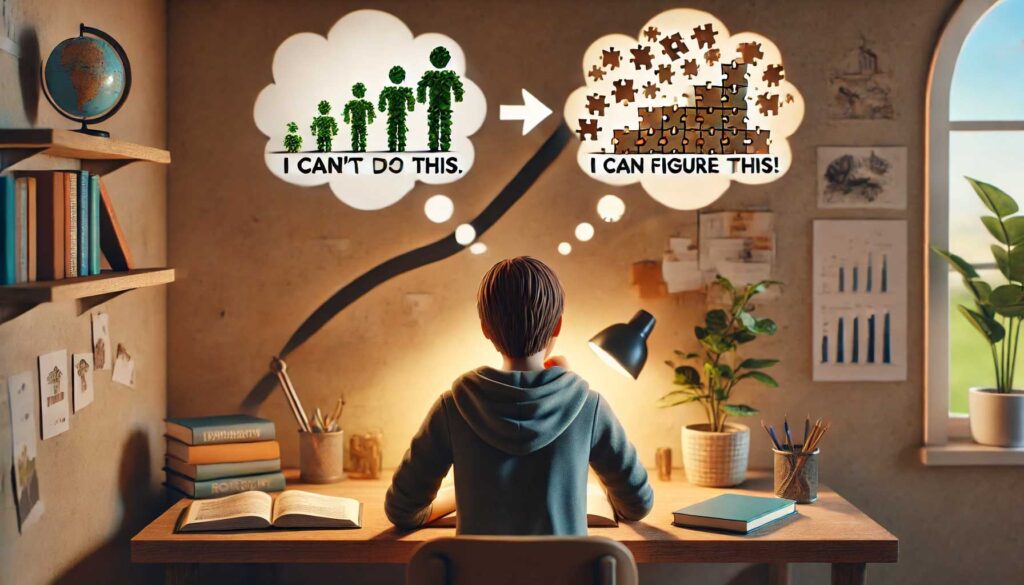
Some students believe they are either “good” or “bad” at subjects like maths or science, as if intelligence is fixed. But research shows that intelligence and abilities are not set in stone—they can grow with effort, practice, and persistence. 🌟
This idea is called the growth mindset, and it’s a game-changer. Students who adopt this mindset are more likely to push through challenges, develop problem-solving skills, and achieve higher academic success. 🚀💡
If you’ve ever thought, “I’ll never be good at this,” it’s time to reframe your thinking. Here’s how you can train your brain to embrace learning and success.🌱📚
How to Develop a Growth Mindset 🧠✨
🔹 Embrace Challenges – Growth Happens Outside Your Comfort Zone
It’s easy to stick to what you know—but true learning happens when you challenge yourself. Instead of avoiding difficult tasks, see them as opportunities to grow. Every time you struggle with a problem, your brain is creating new connections, making you smarter and more adaptable. 💪📖
💡 Example:
Imagine you’re learning a new language, and you struggle to pronounce certain words. Instead of thinking, “I’m just bad at languages,” tell yourself, “I haven’t mastered this YET, but with practice, I will.”
🔹 Learn from Mistakes – Fail Forward
Mistakes aren’t failures—they’re part of the learning process. Instead of feeling discouraged when you get something wrong, ask yourself:
✔️ What went wrong?
✔️ How can I fix it?
✔️ What will I do differently next time?
Every time you review your mistakes and try again, you’re training your brain to improve. The more mistakes you make, the more you learn! 🔄✏️
💡 Example:
You get a low grade on a maths test. Instead of thinking, “I’m terrible at maths,” try, “I didn’t understand this topic fully, but if I practise, I can improve next time.”
🔹 Focus on Effort, Not Just Results – Success is Built Over Time
Success isn’t about being naturally talented—it’s about consistent effort. The more you practise, refine, and push yourself, the stronger your skills become.
Think of learning like building muscle—you don’t get stronger overnight, but with regular exercise, you improve over time! 🏋️♂️🧠
💡 Example:
A professional athlete doesn’t become great by winning one game—they train daily, make mistakes, and learn from them. The same applies to academics, creativity, and personal growth.
Why a Growth Mindset Works: The Science Behind Resilience & Success 🌱📚
A growth mindset isn’t just a belief it’s a proven strategy for increasing motivation, confidence, and long-term success. When you believe your abilities can improve with effort, you develop resilience, handle setbacks better, and stay motivated to keep learning.
Here’s why this mindset makes such a difference:
✅ Increases Motivation – Why Students with a Growth Mindset Keep Going 🔥📖
Ever felt like giving up on a tough subject because you just weren’t “good at it”? That’s a fixed mindset talking—the belief that intelligence and skills are static. But when you embrace a growth mindset, you start seeing challenges as opportunities to grow, rather than obstacles.
💡 Example: “I’m bad at maths”
A student struggling with algebra might think, “I’m just bad at maths.” But with a growth mindset, they reframe it as “I haven’t mastered this YET, but with practice, I will.” This shift in thinking helps them stay motivated, keep practising, and eventually improve.
✅ Reduces Fear of Failure – Turning Setbacks into Comebacks 💪❌✅
Fear of failure can hold you back from taking risks, asking questions, or trying something new. If you see failure as the end of the road, you might stop trying. But with a growth mindset, failure isn’t the end—it’s a valuable learning experience.
✅ Encourages Lifelong Learning – Preparing for Success Beyond School 🚀🌍
A growth mindset doesn’t stop at school—it’s the foundation for lifelong success. Whether in university, careers, or personal development, people who believe they can learn and improve are more likely to achieve long-term success.
💡 Example:
Many of the most successful people—from entrepreneurs to scientists—credit their achievements to continuous learning and perseverance. Instead of thinking, “I’ve learned everything I need,” they ask, “What can I improve next?”
Having a growth mindset means being a lifelong learner, ready to adapt, improve, and succeed in any situation.
Try It Today! 🌱💡
Reframe your mistakes as learning opportunities. The next time you struggle with something, remind yourself:
💭 “I don’t know this YET, but I will learn!”
Start embracing challenges, celebrating progress, and believing in your ability to grow. Your future self will thank you! 🚀✨
